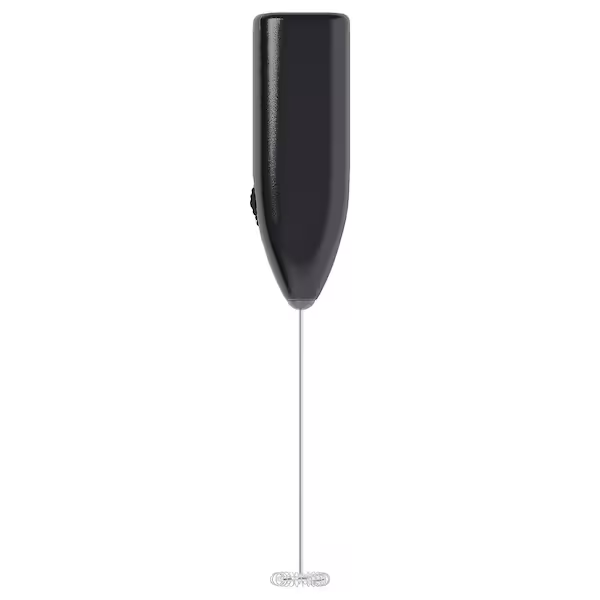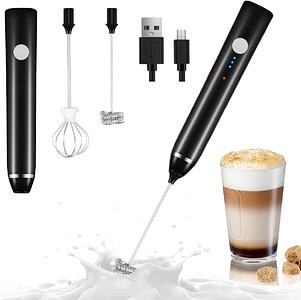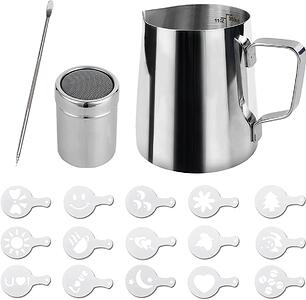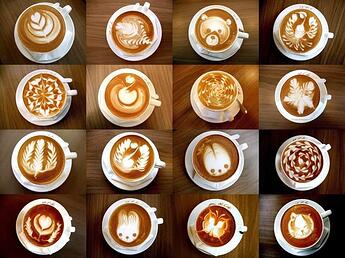Isn’t that item just for cold coffee though … 
Hi Carol, I was amused reading this as I recall roughly 50 years ago whilst in the UK being disgusted with most coffee at that time compared to other countries I’d been.
Conversely tea, especially loose tea from places like Bentalls in Kingston ( seem to recall at least 6 types of Darjeeling alone, aside from a multitude of others Assam, Broken Orange Pekoe, Gunpowder, etc etc. ) was excellent.
But… back to your question… indirectly.,
I recall one ‘coffee’ brand which we nicknamed “Pxxxx MUD” because that is what it tasted like.
I was often out at Biggin Hill Airport in those days and frequented an onsite cafe that sold a most uninspiring excuse for coffee.
I got to know the staff & suggested they let me bring & make my own Filter coffee.
The aroma permeated that place & very soon the questions came " Can we buy cups of that coffee"
It was decided that this coffee & their ^%&* would both be offered for sale but ‘mine’ was to be sold at a significantly higher price.
Need I tell you that their original ‘coffee’ then stayed virtually unsold as people were more than happy to pay the higher price for ‘real’ coffee from that time forward.
Now the UPside of this is that you should NOT have to pay a high price to obtain coffee that you personally enjoy.
From what you describe & irrespective of brand the coffee you bought was a dark or heavily roasted coffee.
My suggestion would be for you to LOOK at the jar for a plain ARABICA bean coffee.
Also check that the label describes it as a light or medium roast .
That SHOULD provide you with a good starting point and you can build from there,
Brandwise it is difficult as so called major brands often sell CRAP coffee.
Conversely be aware of unrecognised or little known brands.
Coffee, decent coffee, can be a minefield & of course your own personal taste …
I’d suggest buy SMALL sizes and try.
How you make your coffee also obviously plays a part - too strong or too weak & it may be unpleasant. Milk? full cream or other ? Coffee ‘cream’ additives.?
As said … it can be a minefield.
I recently suggested Caro a coffee alternative to one UK resident with other issues & you might even care to try that or alternate with it,
Hope you find some coffee/S that you enjoy,
Would love to hear how you fared further up the track. 
.
I’ve never tried it.
Chicory is definitely an acquired taste .
I still use Camp in coffee and walnut cake, like my granny did, it gives a good flavour
Yup, just a Bodum cafetière for me
I have got a milk frother, though
You can froth milk using a basic cafetiere
Sorry, but, any Coffee is crap Imo as a drink, but I do like Coffee Cream chocolates. 
I don’t think Camp Coffee is actually coffee, my grandmother used to drink as a taste acquired during WWI when coffee was difficult to get.
For frothing, I started off with one of these:

£1.50
then bought one of these, which performs other functions, too:
3 Gear Adjustable Milk Bubbler for Latte, Cappuccino, Hot Chocolate, Egg Beating
£14.99
which led to this:
Milk Frothing Jug (not to scale)
£9.49
which, for a while, led me down the road of obsession … ![]()
Years ago we had a craze for a filter coffee machine that used paper filters. We used to go to a small coffee shop where they sold hundreds of different blends. Our favourite was Blue Mountain and we drank it for years and years. Then we moved counties and couldn’t find a coffee shop like that so we packed the machine away. That shop used to smell amazing.
Customer … waiter, this coffee tastes like mud!
Waiter … that’s not surprising sir, it was only ground this morning. BOOM BOOM 
Having ground coffee is ok but I would rather have it in a cup  seems a bit silly to have it at ground level when you can sit comfortably on a chair
seems a bit silly to have it at ground level when you can sit comfortably on a chair
Hubby bought some a while back when we realised how expensive Costa fancy coffees were.
It’s supposed to be an essence (flavouring like vanilla extract) plus chicory. I can’t think of the name-brand just now, but it was included in a freeze-dried instant coffee!
It’s long lasting, 1 two or a tbsp (if you prefer it stronger tasting), then add your syrup of choice, top with cold/hot milk. Voika! Quick Latte!
Yes, I believe it’s an acquired taste but since my 50s my taste buds have changed slightly. So, I can sincerely say that I enjoy it. 

Isn’t blue mountain one of the best in the world. I can’t remember whether I saw this discussed on a foodie show or elsewhere but I think I heard that the Japanese are the biggest importers and there is some block in this country. Possibly because once people taste this dark nectar, all other coffee is tasteless.
Get it from the plantation:
Jamaican Blue Mountain Coffee Beans - Wallenford
Regular price
$169.99
Sale price
$149.99
Weight: 16 oz
or from an importer:
Jamaica Blue Mountain Coffee
£26.00
Weight: 125g / 4.4oz
or even Amazon:
Jamaica Blue Mountain Coffee 454g Beans
Brand: Coffee Roasters Of Jamaica
Price: £62.00 (£136.56 / kg)
Beware of “Blends”.
Britain was done for when the Coffee House became more popular than the “Tea Shop” 
Tea Shops never made the High Street stink  .
.
Coffee Houses are full of remainers 
In 1706, Thomas Twining opened the first tea shop in London , and it was in the 1720s that black tea became more popular thanks to the addition of milk and sugar, something that was not done in China. It overtook green tea which, until then, had been the more popular choice. Propelled by its ever-increasing popularity among the elite classes, imports of tea rose dramatically . It helped to drive the price down, and by 1750, the lower cost of the leaves opened the drink up to new levels of society.
The first coffee house in this country opened in Oxford in 1650; by 1683 there were more than 2,000 in London. They created a distinctive social culture by treating all customers as equal and played a key role in 18th century financial, literary, scientific and political change. The news of the day was discussed, merchants held auctions of goods, writers and poets conducted discussions, gave lectures and demonstrated their experiments, and philanthropists deliberated reforms.
Answer this one then, how come the High Street dain’t stink of Coffee in the 70s and 80s?
Coffeehouses were replaced by swathes of cafés selling cheap breakfasts, tea, and instant coffee.
Serving the masses.



